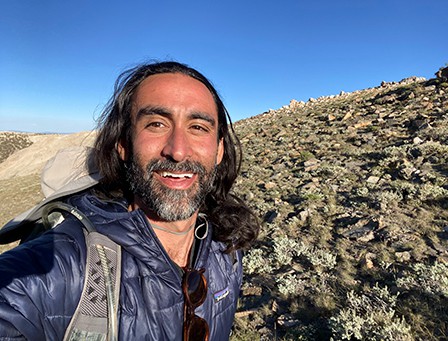Rahmin Sarabi: Commonweal’s New Strategies and Partnerships Director
by Kyra Epstein, Commonweal Communications
Growing up in the relatively progressive city of Portland, Oregon, Rahmin Sarabi spent his high school years working to further participation with the student government at his school; in fact he helped re-write and pass a new constitution that created the school’s first representative senate.
The son of two Iranian immigrants, he felt that he was well integrated and accepted into the mainstream. But moving to the South to study biomedical and electrical engineering at Duke University, he found himself immersed in North Carolina’s history of slavery and socio-economic tensions. Three weeks into his freshman year, terrorists hijacked the planes that hit the World Trade Center on September 11, 2001. The crisis and aftermath that followed was the beginning of a new kind of awareness for Rahmin, deepening his inquiries about social and power structures.

Moving to San Francisco after college, he focused on creative, socially minded business as a vehicle for change. He was part of the early team at Good Eggs where, through human-centered design methods, they created an online grocery in service of a mission to grow and sustain local food systems. He worked next at Opendoor, exploring how culture, operational systems, and leadership can evolve so that the people and organization continue to thrive.
“I am a student of human-centered design,” Rahmin said. “Whatever we’re trying to create, whether it’s a program, product, or a piece of public policy, it’s going to be better if we start by building deep empathy for the people involved, the people we’re trying to serve. With Good Eggs, it was getting to know eaters in our community and farmers and foodmakers…so we could meet people where they are at, and support their aspirations,” he said.
Rahmin left full-time roles in the startup world 2 ½ years ago as he became increasingly concerned about the worsening ecological crisis and the polarization of politics. Since then, he has been conducting independent study in the fields of deliberative democracy and self-organizing networks while working as an independent design researcher and strategist. He is a contributor to the first statewide Citizens’ Panel on COVID-19 in Michigan, a deliberative process empowering 30 representative citizens, selected by lottery, to work across differences and find shared policy recommendations to guide the state forward. He’s part of the learning community at the Co-Intelligence Institute, focused on the design patterns that lead to a “Wise Democracy.”
“These sorts of citizen-led processes are particularly great with highly charged, seemingly intractable issues where our typical politics seem stuck, if not outright dysfunctional,” he said. “I’m really hopeful that they can help us turn towards our grand challenges, and towards each other through the process.”
His introduction to the Commonweal community was as a volunteer at the first Power of Hope youth camp in Bolinas. After that, he attended the Four-Seasons Permaculture course at the Regenerative Design Institute at Commonweal Garden, and then attended the Commonweal Fall Gatherings. Last year, he was asked to join the Commonweal Board of Directors, and then to join as Strategies and Partnerships Director this fall.
What does his job entail?
“In partnership with Oren and Michael, I’m asking the question of what Commonweal’s role is at this time—what ours is to do—and how we can be of most service. Oren led the development of an inspiring vision document for the next 45 years, and now we’re working to ground and birth that. My orientation is first to listen and then to create collaborative dialogue amongst many of the programs at Commonweal, to help the community better sense where we feel energized, and what work we’re being called to,” he said. “Throughout, I’ll be looking for how we can build bridges between the gems in the Commonweal community and the people and places in the world where they can best serve.”
He is also starting a new program at Commonweal, tentatively called The Democracy Project, which he envisions will integrate his work in deliberative democracy with Commonweal’s history as a convener. Early visions include organizing Bay Area focused citizen deliberative councils on topics like wildfire resilience, justice, and housing.
Finally, he’s also a co-founder of THRIV Living, an integrative elder care service in Sonoma and Napa that has been incubated through his client work.
Photo at top: Inspired, in part, by the Chapel at Commonweal, Rahmin was part of a group that built a Bernal Hill altar: instagram/altarforhealing